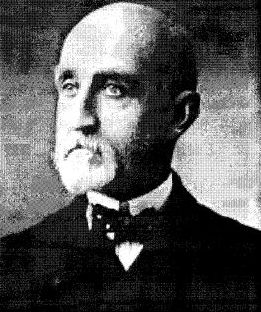- Author
- Waring, P.S., Midshipman, RAN
- Subjects
- Biographies and personal histories
- Tags
-
- RAN Ships
- None noted.
- Publication
- September 2008 edition of the Naval Historical Review (all rights reserved)
Academic leadership, writings on the history of seapower and his influence on the international struggle for command of the sea pre-WWI
(submitted as an entry in the RANC Graduation Naval History Competition, 2007)
‘The function of the historian is neither to love the past nor to emancipate himself from the past, but to master and understand it as the key to understanding the present.’ E.H. Carr
Introduction
Capt Alfred Thayer Mahan, USN, hardly seems at first glance an appropriate subject for a history essay framed by the concept of leadership. His sea-going career can be characterised predominately by insignificance bordering on ineptitude. In fact prior to the revelation that was to transform him from a somewhat irrelevant naval officer to a figure of global renown, Mahan the naval sea captain was destined for the appendixes of history, barely an afterthought for the generations of naval historians to come.
Sired himself by a noted military intellectual, Mahan’s most significant contribution to history was his usage of it. With a style and lucidity more akin to a university scholar than a late eighteenth century naval officer, Mahan tied the rise and fall of the great powers and the outcome of the great campaigns of history – particularly in Europe from the mid-seventeenth century until the age of Pax Britannica – to the concept of command of the sea. In essence he argued that sea power or the lack thereof was the key determinant for national success.

When assessing the work of any historian it remains pertinent to examine not only what they wrote but also the era in which they wrote it. No historian can completely escape the charge of bias and in the case of Mahan his firm connection to a group of influential Americans intent upon turning the tide of US history away from staunch isolationism cannot be ignored. Nor can we ignore Mahan’s impact on the maritime policy of the two great European rivals of the early twentieth century, Britain and Germany.
Irrespective of the context in which he wrote, Mahan’s true significance lies not in what he argued but rather the way in which his work demonstrates the power of the written word. Historians would be wise to maintain an interest in the so-called father of modern naval strategy, not only to continue an important debate, but to remind them of the influence the historian’s work can have upon not only our interpretation of the past but also the shape of the future.
From Mediocre Seaman to Naval Prophet
Sitting in the English Club in Lima, Peru, Alfred T. Mahan, Captain of the outdated warship USS Wachusett which was stationed in South America in support of the increasingly untenable Monroe Doctrine, had a revelation that would transform his life and arguably the course of contemporary history. The Wachusett was considered as one of the worst ships in the US Navy and a command that reflected the career of an officer whose record for seamanship was average at best. Reading the study of noted German historian Mommsen into the Punic Wars between Rome and Hannibal’s Carthaginians, Mahan was struck by the decisive impact Rome’s naval capability had on the course of events.
After further study Mahan compiled a series of lectures examining the influence of sea power on the course of history for his upcoming posting as a history lecturer at the newly formed Naval War College. The ideas first developed for these lectures would later form the basis of his most important book, The Influence of Sea Power Upon History. Mahan’s thesis was deep and varied, encompassing the linkages between national character, geography and government type with sea power; the acquisition of colonies to provide markets; the building of a merchant marine to trade with; and the importance of a ocean going navy to ensure the attainment of the key enabling factor, command of the sea.
While sea-power was a key determinant for national success it was the rational usage of that power which was most important. A key aspect of Mahan’s work was the idea that `the single-minded use of a navy in the service of rational state policy would overcome structural deficiencies in a nation’s relative status amongst others.’ Sea-power was, if used correctly, a leveling force, helping less endowed states overcome impediments to greatness. For him, Britain and to a lesser extent Holland were the embodiments of this principle.




